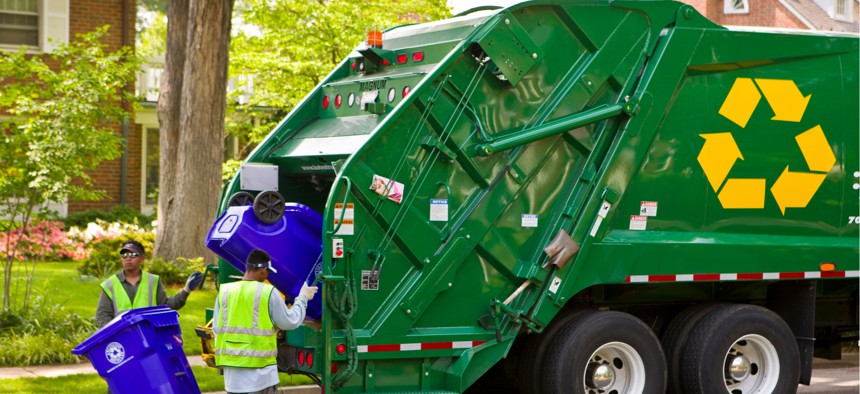A Startup Wants to Turn Your City’s Trash Into a Heap of Big Data

Workers empty recycling bins into a truck in Arlington, Virginia Rob Crandall / Shutterstock.com
One company hopes to create an “Internet of Garbage,” with the promise to bring better logistics to municipal waste.
An Israeli start up is hoping to bring the data and analytics revolution to your local trash truck. GreenQ Technologies gives municipal waste haulers real-time data on residential waste in their city—and with it, the ability to make both immediate and long-term decisions about how to optimize hauling it all away.
A city’s trash is caught up in the whims of changing habits, technology and policy: from the adoption of recycling (and shifting international markets for recyclables), to composting, to the explosion of e-commerce deliveries like Amazon Prime. If there is one constant, though, it is the amount of trash is increasing. Municipal waste in the United States has increased almost threefold over the last 50 years, according to the latest EPA statistics, from 88 million tons in the 1960s to about 254 million in 2013.
That growth has a ripple effect.
“There are more [trash] trucks, more gas emissions, more mileage and fuel consumption and traffic,” Yoel Platt of GreenQ said. “So there are a lot of implications to that waste pickup—and we have to make it more optimized.”
Cities are attempting to make trash collection more efficient—efforts run the gamut from promoting better architectural design to improve garbage collection in apartment buildings to behavioral “nudges” for residents. But bringing the data revolution to the humble trash truck is something that has not become the norm just yet. Platt and GreenQ believe their systems can help optimize trash pickup across the city, make individual trucks more accountable for performance and ultimately save local governments substantial money on a major expense.
Riffing on the ubiquitous networks of sensors rapidly being deployed across the world’s cities, Platt and his colleagues say they are creating the “Internet of Garbage.”
The cameras and sensors GreenQ installs on garbage trucks transmit data in real time that allows a city to monitor trash down to the residential bin-level: how full specific bins are, whether a trash truck missed a specific address, and more. In time, this granular data provides a more comprehensive understanding of when and how much waste each trash truck is picking up across the city.
GreenQ isn’t the first company to looks to sensors to optimize hauling waste. That said, most companies have focused on putting sensors on trash receptacles to provide similar information, and the cost of doing so is not cheap.
Costs aside, as Platt points out, “you can’t put sensors on every bin in the city.” Even if they were inexpensive, the process of installing and maintaining sensors on every trash can and dumpster in a city would be a near impossible task.
GreenQ’s system aims to make it easier to scale across residential trash areas by placing sensors on the trash truck rather than the receptacle. Those sensors will measure “weight and capacity for each lifted can, while monitoring pickup time and location.” That data goes to a dashboard that can show users the real-time progress of their fleet on a map, integrate with other data systems and send customized alerts as requested.
The system is completely automated at the truck level. “What we’ve learned is you do not want to interfere with the crew’s process,” Platt said. “The minute you ask them to do things, they won’t do all of it and your data … won’t be accurate.”
Platt says the system can save cities up to 30 percent of their hauling costs simply through understanding where the trash is (and isn’t), how trucks and their crews are performing, and applying better practices as a result of better data.
Several cities in Israel that have adopted GreenQ found other benefits as well.
“Unfortunately what you sometimes find out is that truck drivers are using their time to pick up from other collection areas ... some side work,” Platt said. “Our system can prevent that.” Platt pointed to other, blatant forms of misuse that have come to the surface, as well. One client discovered an employee was using his trash truck to commute two hours every day.
“It would have been cheaper for him by cab there and back then sending the truck,” Platt quipped.
With recent backing from Urban-X, an accelerator focused on “the unique challenges of working with and in cities,” GreenQ is aiming to bring their solution to the United States.
The startup has already caught the eye of Civic I/O, a nonprofit that collaborates with the U.S. Conference of Mayors and SXSW to provide innovative ideas to city leaders. GreenQ is a finalist in the organization’s civic tech pitch competition, and will be presenting their technology to the mayors in attendance during this year’s event.
While excited for the opportunity, win or lose, says Platt, he’s excited to get “traction” and share the product with city leaders in the United States.
Mitch Herckis is the Senior Editor and Director of Strategic Initiatives for Route Fifty.
NEXT STORY: Smartphones replicate 3D objects for virtual reality






